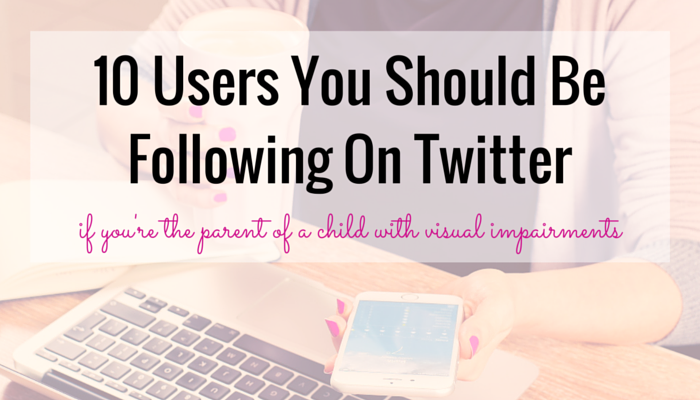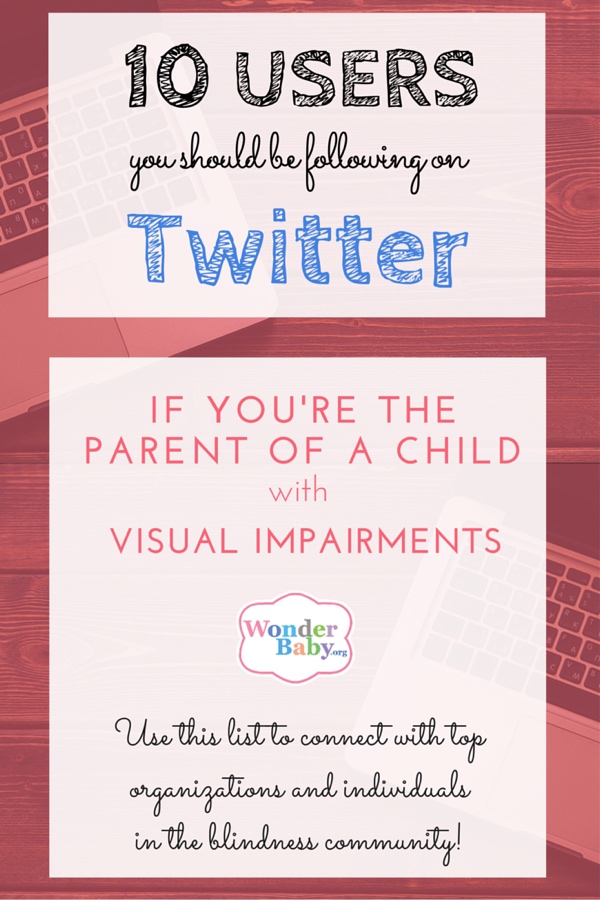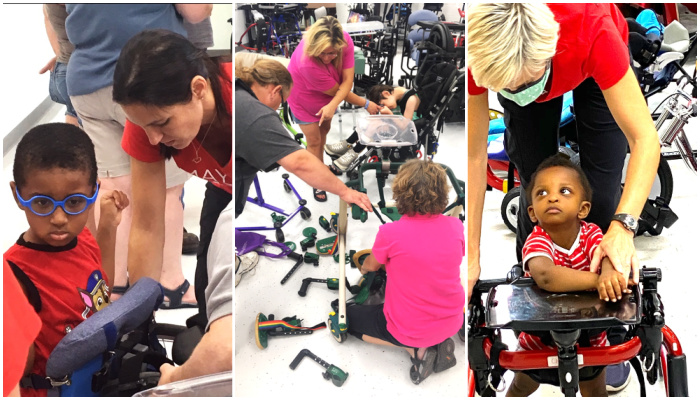10 Users You Should Be Following On Twitter if You’re the Parent of a Child with Visual Impairments

Twitter is home to over 304 million monthly active users. Are you one of them? If not, first go check out our article How to Use Twitter for Parents of Kids with Visual Impairments then come back to add these individuals and organizations to the list of people you follow. If you’re already registered on Twitter, then take a moment to browse through these fellow peeps who rank at the top of the list for sharing quality and updated information that is useful to parents like you! Have one to add? Share it in the comments section below. We love finding great new resources to connect with on Twitter, too!
Individuals & Organizations to Follow on Twitter
- @UnderstoodOrg: Understood is a free online resource for parents of children with learning and attention issues. They host a Twitter chat every Wednesday at 12 EST using #LDchat. @UnderstoodOrg tweets lots of valuable information and free resources like webinars, Q&As with experts, and livestreams relevant to parents of children with special needs.
- @PBrailler: Project Brailler is a Bristol UK based non-profit foundation with the mission to provide Perkins Smart Braillers to blind kids and their families while supporting the importance of Braille on a national level. You’re sure to be inspired and motivated by their goals and the support the project receives from people all over the world.
- @TheMightySite: The Mighty is a website sharing stories from parents, individuals, and many kids who write about a variety of trending and unique topics including disabilities, mental health, and parenting kids with special needs. Their tagline reads “We believe in the power of stories, the strength of communities and the beauty of the human spirit.” Follow @TheMightySite to be inspired, learn, and empathize with people like and different than you!
- @Easter_Seals: Easter Seals HQ provides exceptional services, education, outreach and advocacy for kids and adults living with disabilities. Their Twitter feed is full of blog stories, legislature news, and resources for parents all over the United States. @Easter_Seals also hosts a Q&A chat using #AskEasterSeals where Twitter users can take the opportunity to ask questions on a variety of topics concerning disabilities.
- @BraillePress: National Braille Press ia a non-profit dedicated to promoting braille literacy and access to information through braille books and technology tools. They most often share tweets relating to trending accessibility topics, Braille updates, and products for kids and adults who are visually impaired. Be sure to watch out news about their Great Expectations Program for children who are blind!
- @TVI_ting: Yue-Ting Siu is a Teacher of Students with Visual Impairments (hence, the TVI), #a11y accessibility advocate and assistive technology geek. She’s also an NLCSD Fellow! @TVI_ting shares truly valuable information for parents of teenagers and college students with visual impairments with a strong emphasis on technology. If you have a child who will or already uses assistive tech of any sort, you should follow her!
- @ThomasDoesItAll: Thomas Marshall Does It All is a blog about raising a blind child written by a fellow mom. She shares resources, information and personal stories about how her son experiences the world. Not only will you learn, but you’ll find a variety of stories and snippets you can probably easily relate to as another parent of a child with visual impairments.
- @BlindUnion: The World Blind Union (WBU) is the international organization representing 285 million people globablly who are blind or partially sighted. They’re based out of Toronto, Canada, but as their name implies, they share information and news relevant to people interested in blindness all over the world. Follow @BlindUnion to learn what’s going on globally- it’s good for everyone to gain a little insight. And, if you’re in Canada, definitely follow them!
- @AFB1921: The American Foundation for the Blind removes barriers, creates solutions and expands possibilities so people with vision loss can achieve their full potential. Not only will you find links to their articles on the AFB website and VisionAware, but also from the FamilyConnect website dedicated to parents of children with visual impairments!
- @ADPwebmaster: The Audio Description Project, sponsored by the American Council of the Blind, shares regular updates regarding audio description on TV, DVD and BluRay, theaters and more for people with vision impairment. Follow @ADPwebmaster for daily updates on TV audio description news, plus weekly updates on new release home entertainment movies that include audio description for kids and adults.
Kids bullied her because she looks different. So she did this.
https://t.co/FxFmpF6iRe pic.twitter.com/Zu5OzbCF92
— The Mighty (@TheMightySite) October 19, 2015
Users Sharing on WonderBaby.org
- @LightAide: LightAide is an LED educational tool to engage learners with special needs. The product was based on an idea from a mom with a child who is visually impaired, and brought to life by her, Philips, and Perkins. Follow @LightAide to learn more about the community including updates on the product and resources if you or your child’s school already owns a LightAide.
- @SensorySun: Sensory Sun Educational Technologies is an online resource sharing accessible products for teaching young kids with visual impairments including lesson plans, toy reviews, sensory activity ideas, and more. @SensorySun also is the developer of the iPad app Exploring Braille with Madilyn and Ruff, now available on the iTunes Store. You can read the review on WonderBaby.org, too!
Perkins School Affiliated Users
- @PerkinsVision: Perkins School for the Blind (Watertown, MA) prepares children and young adults who are blind with the education, tools and skills they need to realize their potential. They tweet out info on upcoming Perkins eLearning events, fundraisers, and accessility information including technology and braille. @PerkinsVision also Retweets other Perkins School affiliates, among other industry leaders.
- @PathstoLiteracy: Paths to Literacy promotes literacy for students who are blind, visually impaired, deafblind, as well as those with multiple disabilities. They’re a project from @PerkinsVision and @TSBVI_Outreach sharing activity ideas, braille book resources, science and math lesson plans, and more for parents and teachers. If you’re a TVI, you should definitely follow @PathstoLiteracy!
- @Perkins_Library: The Perkins Library provides free services to Massachusetts residents who have difficulty reading print materials due to a disability as part of @PerkinsVision. If you live in Massachusetts or the surrounding New England area, then you will find their tweets helpful. If you live elsewhere, you can still follow @Perkins_Library to learn more about what they do to help kids like yours so maybe you can implement the ideas locally!

Related Posts

Eye Conditions and Syndromes, Visual Impairment
Neuralink Announces Plans to Restore Sight to the Blind with Brain Chip
Elon Musk’s company Neuralink has announced plans to begin human trials of its new “Blindsight” brain chip by the end of 2025.

Visual Impairment
The Gift of Understanding: How a Young Child Helps His Blind Father Navigate Life
When a parent is blind, it’s natural for people to wonder how their sighted child will adapt. Will they struggle to understand their parent’s needs? Will they feel burdened by...

Assistive Technology, Support
May We Help: Engineering Independence for People with Disabilities
May We Help is dedicated to designing and building custom solutions that help individuals of all ages achieve mobility, access, and independence, all at no cost.